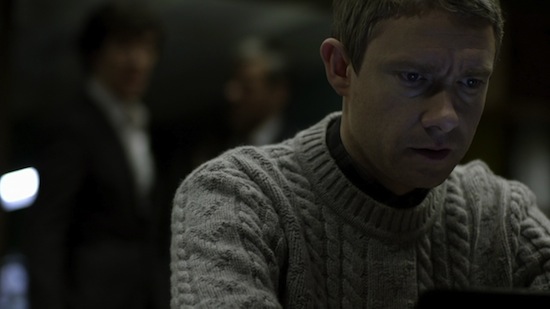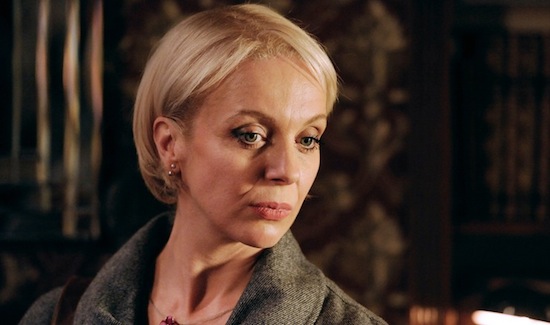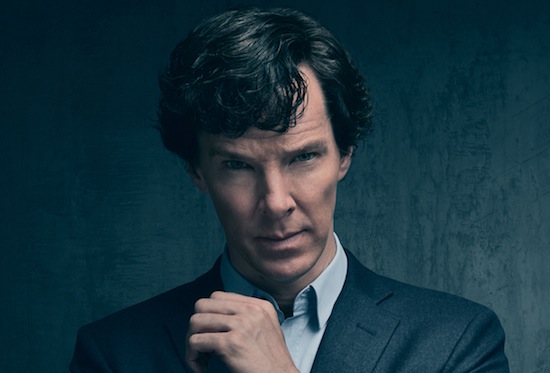Contains a memory palace full of spoilers
It’s great when you’re the showrunner of a massively beloved TV show with legions of loyal fans. Because even with a schedule that requires three episodes every two years, you can basically do nothing for twenty-three months, and then toss out some scripts over a weekend Pro-Plus binge. It’s fine, they’ll watch anything, as long as you Do The Things.
Sherlock is a TV show based on the intricately plotted detective stories by Sir Arthur Conan Doyle, where the brilliantly analytical Sherlock Holmes unravels mysteries with rigorous deductive reasoning.
Season four of Sherlock the TV show is about a man with magic powers and a collection of Things That He Does, who has a bunch of friends who all have one character trait each.
Episode one, written by co-showrunner Mark Gatiss, opens with a recap of the "did you miss me?" Moriarty cliff hanger from three years ago. Moriarty was dead, but maybe he wasn’t. And you know what, I did miss Moriarty, when they killed him off, or maybe didn’t kill him off, but it’s been a while, and I’ve kind of got over it. But the fans love that stuff, apparently.
The story proper gets underway with a zany comedy spat between Sherlock and his brother Mycroft, because Sibling Rivalry Hides Deep Bonds. That’s one of The Things. The fans love that stuff.
It then re-establishes that Moriarty’s cunning plans reach beyond the grave, and shows us the creation of fake evidence to get Sherlock off a murder charge. This has no bearing on the rest of the story, but it does mean they don’t have to write their way out of that cliff-hanger, so that’s nice.
We then see a montage of snippets of cases we don’t see in full, in which characters repeat lines from previous adventures like, "it’s never twins", to which the audience can respond, "I Remember That, From When Sherlock Was Good, And They’ve Done It Again, So That Means It’s Still Good". Also because Repeating Jokes Is Funny and The Fans Love That Stuff.
The adventure snippet montage is also a trick from a previous episode, but that’s good, because I remember that, and they’ve done it again.
Then the Watsons’ baby is born, and they discuss baby names, and Sherlock says "you know what I think", and they do the joke about how Sherlock isn’t a girl’s name, because Repeating Jokes Is Funny. I DO know what Sherlock thinks!
There’s then a mystery about a missing teenager, and it looks like we might actually get a detective story. Holmes solves it immediately, though, using magic. He says something about intuition being high speed reasoning, and then just knows the complete solution. It’s good though, because there’s a montage and some graphics.
This leads to something else that looks like it might be a detective story. Someone is going around smashing busts of Margaret Thatcher, and murdering anyone who gets in the way. There is absolutely no reason why they’re of Thatcher, but someone gets a throwaway line about how Thatcher is like Napoleon, which she isn’t, but there are six of the busts, and there’s a Conan Doyle story called The Six Napoleons, and I remember that, from the books. So that’s good too.
Anyway, it turns out that one of the busts has something hidden in it, which appears to be a thing that was destroyed in an episode from two years ago, and there’s a quick flashback that doesn’t really explain what it is, but Sophisticated Writing Uses Call-Backs, so it must be good.
The upshot of all this is that there’s a chap on the loose who wants to kill Watson’s wife Mary because of something we don’t know about her secret past as a super-spy. At which point, the episode turns into a shoddy John Le Carre rip off for about half an hour. There’s a lot of fighting and shouting and some torture.
We get a montage of Mary jetting around the world doing spy stuff, with faked passports, and false identities, and some graphics, and none of it advances any plot points. Sherlock and Watson find her, having planted a tracking device on her all along, meaning she was never really missing, and the whole sequence was entirely pointless, except it makes Watson Do A Sad Face. I remember that, Watson’s Sad Face, and they’ve done it again.
Mary’s wannabe killer strolls into the room at this point, because it’s time in the story for that to happen, despite the fact there is no way he could have found her. Said aspirant killer explains what’s going on like a villain at the end of an episode of Scooby Doo Where Are You?, which is nice, because it wasn’t making any sense at all up to now. He explains everything, and then gets shot. But he leaves out one crucial detail, because there’s still half an hour to fill.
Then, for no reason whatsoever, the episode turns into a melancholy relationship drama about John Watson contemplating infidelity with a lady he met on a bus. This is because Important Characters Have Flaws.
Anyway, the mystery, such as it is, is soon solved by Sherlock using magic. He’s standing on a bridge, and he doesn’t know what’s going on. There is a montage of stuff from earlier in the episode, and some graphics, and then he knows. Sherlock and Mary go to confront the arch villain, who turns out to be an elderly secretary from earlier in the episode, who starts telling Sherlock a story he’d discussed with Mycroft earlier, because Sophisticated Writing Uses Call-backs.
Then the secretary attempts to shoot Sherlock, but Mary jumps in front of the bullet, echoing a previous story where Sherlock took a bullet to protect her, because Sophisticated Writing Uses Call-backs. Except nobody phones an ambulance or anything and Mary dies, because it’s time in the series for that to happen. Mycroft appears and Does A Sad Face, because Sibling Rivalry Hides Deep Bonds.
Then there are some shots of Watson in a graveyard, like in the other story when he thought Sherlock was dead, and I remember that. Watson Does A Really Sad Face. Sherlock also Does A Sad face, because Underneath His Cold Exterior Beats A Sensitive Heart.
Then there’s a scene like when Watson thought Sherlock was dead and he went to a therapist, and I remember that, but hang on… it’s SHERLOCK talking to a therapist, so it’s like the same but new.
No detective work takes place in this episode.

Cheer up John, it may never happen
Episode two, this time written by the other co-showrunner, Stephen Moffatt, opens with a heart-rending sequence of a bereaved Watson in the therapist’s chair, which is interrupted by the comedy arrival of a mystery figure in sports car, because nothing sets off an emotional moment like an exploding cigar and spinning bow tie.
It’s good to have the show-runners doing all the writing, because nobody can interfere and make them change things. That’s how you guarantee quality.
Toby Jones appears and has a fine old time hamming it up as Culverton Smith, a horrible amalgam of Yewtree Investigation defendants, and confesses to a murder, which suggests there might be a detective story afoot. The twist is that all the people who heard the confession – including Smith’s daughter, Faith – were given a memory-altering drug. Said daughter takes her fragmentary recollections to Sherlock, but can’t recall the victim’s name.
Sherlock is really, really high on something, like in the other story that time, Because Important Characters Have Flaws. I remember that, so it’s good. Sherlock figures out a bunch of stuff about her case using magic, and it’s hinted that she’s a figment of his drugged imagination.
Mary also appears as a sort of imaginary friend to Watson because Sophisticated Writing Uses Parallels. Also because No-one Ever Really Dies in Sherlock.
Sherlock spends the night taking care of Faith Smith because Underneath His Cold Exterior Beats A Sensitive Heart. Faith says "you’re nicer than I expected", in case you didn’t pick up on this, which is helpful.
Sherlock then figures out that Smith’s confession isn’t to a single murder, but to being a serial killer. He does this using the magic where he doesn’t know something and then there’s a montage and some graphics and now he does know.
Homeless drug addict Billy Wiggins from a couple of seasons ago is living in Sherlock’s flat. He has no bearing on the story whatsoever, but I remember him, and he’s here again, so that’s good.
Sherlock shouts at Mrs Hudson and almost shoots her in the head, and she makes him a cup of tea because It’s OK When Sherlock Acts Like A Dangerous Psychopath. Sorry, He’s Not A Psychopath He’s A High-Functioning Sociopath. It’s established that Sherlock Hates Smith More Than Any Other Villain He’s Faced, despite the fact he’s said this about two other villains in the past, because that’s required to justify something that happens in about twenty minutes.
Sherlock brings together all the main characters in Watson’s therapist’s house using magic. Watson and Molly check Sherlock’s drug intake levels like in that other story that time, because Sophisticated Writing Uses Call-backs. Watson blames Sherlock for Mary’s death, because that’s necessary for the arc of the story. SPOILER: later, Watson doesn’t blame Sherlock for Mary’s death any more, because that completes the arc of the story.
Watson and Sherlock go and meet Culverton Smith, because it’s time for that to happen. Smith and Sherlock discuss the nature of serial killing in front of a bunch of kids in a hospital, which is very creepy, but only in the sense that you can’t quite believe the child actors’ parents signed off on it, nor that the BBC think on-the-nose Jimmy Savile caricatures are something they have any business making.
Then there’s some shouting in a mortuary. Faith shows up, but it isn’t the Faith who Sherlock met. Sherlock goes bananas and stabs Culverton with a scalpel, because he Hates Smith More Than Any Other Villain He’s Faced, and also It’s OK When Sherlock Acts Like A Dangerous Psychopath. Sorry, He’s Not A Psychopath He’s A High-Functioning Sociopath.
Smith survives and Watson beats up Sherlock, because that provides the necessary catharsis for him to not blame Sherlock for Mary’s death any more. Sherlock Does A Sad Face because Underneath His Cold Exterior Beats A Sensitive Heart.
Then we see that Sherlock took such a nasty kicking off Watson, he’s in hospital hooked up to life support machines, because that’s necessary for something that’s about to happen, even though he wasn’t actually that hurt. Smith sneaks into the hospital room to kill Sherlock. Watson works out that this is happening using a combination of magic and hints from Ghost Mary, and arrives in the nick of time to prevent the murder.
It transpires that Sherlock engineered the entire situation in order to deliberately almost get murdered, so Watson would come and rescue him, and everyone could be friends again. It further transpires that Moffatt engineered the entire story in order to provide an excuse for Sherlock to hug Watson, because Underneath His Cold Exterior Beats A Sensitive Heart and The Fans Love That Stuff. Ghost Mary mentions Irene Adler, from series two, and I remember her. We hear the sexy sigh text message alert she put on Sherlock’s phone, because Repeating Jokes Is Funny. Sherlock Does A Sad Face when he talks about Irene Adler, because Underneath His Cold Exterior Beats A Sensitive Heart.
Then there’s an epilogue where Watson’s therapist is revealed to be both Faith’s impostor that Sherlock met AND the lady on the bus that Watson didn’t actually have an affair with… AND Eurus Holmes, Mycroft and Sherlock’s secret sister!
No detective work takes place in this episode. As a fan, I remain confident that the writers respect my intelligence.

Episode three is written by both showrunners, working together, so it’s twice as good as all the others put together times two.
To be completely fair, about half of this episode is like a quite good episode of a different show. The other half is like a really bad episode of Sherlock.
Eurus Holmes, the secret sister, is magic, only evil. She’s evil for no reason whatsoever, except it’s necessary for what’s going to happen.
Eurus blows up Sherlock’s flat with a magic grenade. Sherlock, Watson, and Mycroft escape using magic. They then appear on a ship heading to a remote island by using magic. There is no explanation of how they get from one place to the other, though it’s made very clear that it would be impossible. But The Fans Love That Stuff.
I think back to the first episode of season one, where the villain was a terminally-ill cab driver, who played a strange, melancholy, poison-based game of Russian Roulette, and the centre-piece was a mesmerising twenty-minute scene of he and Holmes sat at a table talking. I start to suspect that standards have slipped.
The island is a special prison for magic evil people. Mycroft has imprisoned Eurus there, but has made several critical mistakes, because that’s necessary for what’s going to happen, and Important Characters Have Flaws. Eurus’s cell is a bit like the cell from Silence Of The Lambs. A character says, "It’s Silence of the Lambs, basically", which is helpful.
Eurus takes control of the prison, which is handily laid out like a sadistic version of The Crystal Maze, and puts Watson, Sherlock and Mycroft through a series of challenges that were designed either by an evil super-genius of incomparable intellect, or a lazy writer who skimmed the Wikipedia page about The Trolley Problem. It really could be either.
Remarkably, things actually go downhill from here, and I begin to feel angry. The writing is like watching someone attempt to solve a jigsaw simply by banging in pieces wherever with a hammer, only less amusing. Here’s Molly, in a completely spurious scene, because The Fans Love That Stuff. Here’s Sherlock’s parents, because The Fans Love That Stuff. Here’s a bit with them playing violins because The Fans Love That Stuff. And none of it makes any sense whatsoever.
I shan’t spoil the rest of the episode because, well, to be honest, I can’t. I really don’t know what happened. There was a child on a plane who wasn’t on a plane and was also Eurus, but I don’t even care at this point.
The whole thing culminates with a recorded message from Dead Mary, Who Seems To Be Talking To John And Sherlock But Is Really Talking To The Audience, DO YOU SEE? Mary has the brass neck to tell us "it’s all about the adventures, the stories". Well, yes, Mary. Might have been nice if someone had written some.
So… Sherlock season four then. As ever, wonderful design, beautiful cinematography, fantastic performances, incredible sound, gorgeous costumes and sets. And a load of absolute bollocks. Please, let this be the end.


